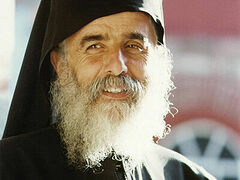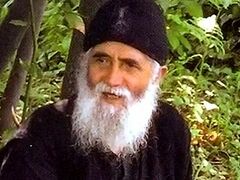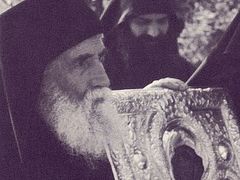Part 1: “My First Meeting with Elder Paisios”
 Great-Martyr Euphemia the All-Praised
Great-Martyr Euphemia the All-Praised
And then suddenly Elder Paisios added:
“Do you know who sat where you are sitting now?”
There was a stool with a candlestick on it, and an icon of St. Euphemia hung above it.
“No, Geronda. How can I know who sat on this stool?”
Then he told me the miracle of an appearance of the holy Great-Martyr Euphemia.
One day the elder went to Souroti Convent on church matters to the metropolitan. They spoke, the elder expressed his opinion, but some doubt remained in him: What if he was wrong? At that time some female students were on pilgrimage to the convent and were eager to meet the elder. Since the elder was leaving the following day, he asked the nuns to tell them that he would not be able to receive them. Then the nuns asked the elder to allow the students to come to him and receive his blessing. “Let them come,” he said. About five or six girls came, and one of them, the bolder one, said to the elder, “Geronda, I really want to talk to you” “Unfortunately, I can’t, I’m leaving in the morning,” Elder Paisios answered her. “Okay, then I’ll come to you on Mount Athos. Do you bless me?” she insisted. “Come!” the elder replied jokingly. The elder was a joyful person, so he often joked.
Two or three days after his return to Mt. Athos, one fine morning, when the elder was reading the Hours, someone suddenly knocked at the door. “Who’s there?” Elder Paisios asked. “Open, father,” a woman’s voice told him. “Who is this?” he asked. “Euphemia,” he heard the answer. The elder immediately recalled that girl and thought: “Has she gone crazy and come to Mount Athos?! What should I do now? She probably changed into men’s clothes and came.” The elder had various thoughts. He was silent for a while. Someone knocked on the door again:
“Open, father!”
“Who are you?”
“I’m Euphemia.”
The elder did not open. She knocked a third time:
“Open, father!”
“I won’t open to you.”
Then she opened the door herself, and the Mother of God, St. John the Theologian and St. Euphemia entered his cell. The Most Holy Theotokos looked at the elder with great love and gave him a smile. The elder fell to the floor and bowed to Her, and She touched his forehead. St. John the Theologian did the same. The elder saw a young woman standing behind them, but did not know who she was. The Mother of God called to St. John, and they went into the church, where they disappeared. Only St. Euphemia remained in the cell with the elder. The elder said to her:
“And who are you?”
“I am Martyr Euphemia.”
“Which Euphemia?”
“Martyr Euphemia.”
“Let’s check if you are really Martyr Euphemia,” The elder had not known anything about St. Euphemia before.
Then he told her:
“Let’s make three bows to the Holy Trinity and check if you are a saint.”
“Let’s do it, father.”
The elder turned east and said, “In the name of the Father, and of the Son, and of the Holy Spirit,” and bowed to the ground. “And now do the same,” he commanded. She repeated it, though she stood facing the north, and said the prayer quietly and somehow diffidently. The elder told her sternly, “Stand here and say the prayer loudly so that I can hear you.” St. Euphemia smiled and answered him, “All right, all right, father!” She stood as the elder had told her and said that prayer. As it turned out, the elder had not noticed that where St. Euphemia had bowed for the first time there hung a small icon of the Holy Trinity on the wall; so St. Euphemia had bowed to the icon, not just to the north. Elder Paisios had not noticed this, because it was not he who hung the icon, but Fr. Tikhon.
When he realized that it was indeed St. Euphemia, they sat down in his cell, and the saint sat on this very stool, on which I was now sitting. The saint first explained to him the question that the elder had discussed with the metropolitan, saying that he had answered him correctly. Then she related her Life to him, because the elder had not known it. She also told him about her torments, and while she was speaking, the elder saw them, just as we watch TV. The elder looked at these events with great awe and was even frightened at some point, saying to her, “How could you stand this?!” St. Euphemia smiled and replied, “If I had known what glory the martyrs inherit in Heaven, I would have suffered even more.” They spent the whole day together. In the evening, when it was getting dark, she said goodbye to him and left. From that moment on in the place where St. Euphemia had sat the elder had a stool, a small candlestick and a paper icon on the wall. After that Elder Paisios spent a whole week in seclusion. He did not receive anyone, did not eat, did not sleep, but was in a state of grace.
Then he told me many more stories from his life—for example, about how he saw Christ at the age of twelve and different episodes on Holy Mount Athos. At six in the morning, once it was light, a priest from Stavronikita Monastery came to celebrate the Liturgy. Then the elder said to me, “Go and serve, too, deacon!” “Where can I get the deacon’s vestments?” I wondered. “I’ll look for them now,” the elder replied. He found some old sticharion from the time of Fr. Tikhon, tied some strings instead of liturgical cuffs to me and made an “orarion” from an old epitrachelion. Thank God no one took a picture of us at that moment! The elder read, and we served the Liturgy. When the Liturgy was over, he treated the priest to loukoumi, and he left quickly. The elder told me that during the service, at the Proskomedia, he had seen the Lamb of God performing the Bloodless Sacrifice, and described what he had seen with great awe. All this happened on Monday, and I stayed with him until Saturday. So I spent a whole week with him, and it was a week full of grace.
Later when I visited him, the elder allowed me to stay with him in the evenings, and I could see the great spiritual labor he performed, his incessant prayer and how this man lived an absolutely supernatural life. For example, he could stay up all night, spending it in prayer, and then sleep in the morning after sunrise for about two hours. Then during the day he received people, was joyful, in a good mood, talked to everyone, and it was never noticeable that he was tired. He hardly ate anything—he could eat only once in a week. For example, he could tell me, “Today we will cook.” “What are we going to cook, Geronda?” I wondered. “Lentils,” he would answer me. But how was it possible to cook lentils there? He had only one “saucepan” the size of a glass, which he had made from a can. So he put a few lentils (as many as could fit into the can), a spoonful of rice, a spoonful of oil and cooked it all on a spirit lamp. It wasn’t actually boiling, rather warming up. Then he divided it into two: for himself and for me. And then he sent me to Stavronikita Monastery so that I would take a bite and come back. The elder ate almost nothing and did not rest at all. He prayed day and night. In the following years I often visited Elder Paisios, and we became very close.
Today we see him on iconostases. We who knew him personally in theory should not perceive him as a saint, because we saw him every day, ate together, talked, and didn’t discuss only spiritual things. Sometimes I would tell the elder jokes to make him laugh, and various other things that, in my opinion, could interest him. But despite all this, I never got used to him. For example, I cannot say that when I was traveling to the elder I had the same feelings as I had while visiting other fathers. On the contrary, I always felt fear and exactly the same awe as during our first meetings. The same applies to other saintly fathers, such as Fr. Ephraim of Katounakia, Fr. Ephraim of Philotheou, Elder Joseph, etc., who did not do anything special to show their sanctity. Sometimes we even wondered: How can a saint do such things? They didn’t care what others thought of them. Especially Elder Joseph didn’t care at all, and since he knew that there were things that annoyed me, he did them intentionally. He did not accept any criticism and was very excitable. Besides, Elder Joseph was my father-confessor, so he could do anything to humble me.
 Metropolitan Athanasios of Limassol
Metropolitan Athanasios of Limassol
Indeed, this experience on Mt. Athos is of great importance. Today I was remembering Elder Paisios and therefore I decided to share my memories with you as much as possible, because such things are difficult to describe in full. Elder Paisios would tell parents: “Take the trouble to pass on to your children a collection of holy images”, meaning that children from childhood should have good images in their souls and resort to them in times of temptation, gaining strength to live on. Because if bad images persist in their souls, they traumatize children. For example, if the parents quarrel, if a child feels unsafe in the family; if there is fear, violence and the like, the child is filled with bad images and, growing up, has many problems in his life. I was a witness to that myself. Now I am sixty-four, and in difficult moments that happen to everybody these images, these memories from the Holy Mountain are a good inheritance for me, a refuge where I enter and gain strength, courage, consolation and support from God to continue my struggle.
I will never forget how I visited Philotheou Monastery for the first time in November 1976 and stayed there for a whole month. At that time Elder Ephraim (who later moved to Arizona) still lived there. At that time he was fifty-five. On the first Sunday we celebrated the Divine Liturgy together. As a deacon, I was in the sanctuary as well; I stood and looked at the elder and other fathers who were celebrating the service. It made a huge impression on me. So many years have passed, but this picture has not been erased from my memory. Every time I remember it, I am touched and reproach myself, comparing myself with the way these people served. The elder was like an angel, he shone all over, serving with great attention and grace. And almost all of them were bald and their heads glowed, reflecting the candlelight, and it seemed to me that we were somewhere in another realm. I recall how after the service we went to the refectory, the elder blessed the food, we sat down, and I sat next to him. He ate literally two or three spoonful’s and was very concentrated, praying incessantly. It was such great grace!
I can say the same about many other fathers: Fr. Charalampos, who was a great ascetic; Fr. Ephraim of Katounakia, a prophet and a man truly filled with grace; our Elder Joseph, who wept incessantly throughout the Liturgy, while I looked at him and thought: “Where can so many tears come from in this man?” He was not like us who can just shed a few tears, but his sobs were endless. I asked him, “Geronda, why are you weeping at the Liturgy?” And he answered, “I’m crying, feeling sorry about my sins.”
These are the holy images that remain in our hearts and minds. And it would be good to preserve these images for both our biological children and spiritual ones. And parents themselves must have holy experience in their lives. If it is the case, then their children, when the moment of their separation comes, will leave them with a treasury of spiritual wealth. And on the contrary, if they see arguments, anger, fears and anxiety, they will take all this with them. Therefore, parents should take the trouble to pass on the holy spiritual inheritance to their children.





